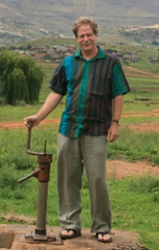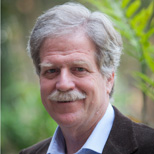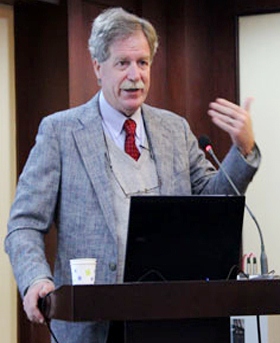By Agha Iqrar Haroon
David Molden is the Director General of the International Center for Integrated Mountain Development (ICIMOD). David has a PhD from Colorado State University specializing in water resources, and has since developed broader interests in integrating social, technical and environmental aspects of natural resources management. He has worked across Asia and Africa, including mountain environments of Nepal and Lesotho. David enjoys interdisciplinary and cross-cultural teamwork aimed at developing solutions and generating and sharing knowledge. David led a global program involving over 1000 practitioners and researchers to produce a Comprehensive Assessment of Water Management in Agriculture, with results documented in the publication Water for Food, Water for Life in 2007. He has contributed to the publication of nearly 200 pieces of works in books, refereed journals, research report series, the media, project reports and educational material. David was awarded CGIAR Outstanding Scientist for 2009.
The Dispatch News Desk (DND) that is the only tri-lingual online newspaper from South Asia, providing news, articles, opinions and comments in Urdu, English and Russian languages is publishing interview of Dr. Molden to connect our readers with ICIMOD Nepal. This interview provides an opportunity to readers, scholars, development scientists, students and anthropologists to understand how a successful organization can do a lot for communities, nations and regions if it has strong leadership.
Interview with Dr David Molden, Director General, ICIMOD
Question: Dr David James Molden, people do not know much about the areas of work of ICIMOD. Would you like to tell us about this important organization? 2. What is ICIMOD’s Vision? 3. What is your Mission?
Answer: ICIMOD’s Vision: “Men, women, and children of the Hindu Kush Himalayas enjoy improved wellbeing in a healthy mountain environment.”
ICIMOD’s Mission: “To enable sustainable and resilient mountain development for improved and equitable livelihoods through knowledge and regional cooperation.”
ICIMOD is a regional intergovernmental learning and knowledge sharing centre serving the eight regional member countries (RMCs) of the Hindu Kush Himalayas: Afghanistan, Bangladesh, Bhutan, China, India, Myanmar, Nepal, and Pakistan. ICIMOD is based in Kathmandu, Nepal.
Globalization and climate change have an increasing influence on the future of fragile mountain ecosystems and the livelihoods of mountain people. ICIMOD aims to assist mountain people to understand these changes, adapt to them, and make the most of new opportunities, while addressing upstream-downstream issues.
We support regional programmes through partnership with regional partner institutions, facilitate the exchange of experience, and serve as a regional knowledge hub. The programmes are regional in the sense that they deal with issues of importance across several of our member countries, they are set up to share knowledge across countries, and in some cases deal with transboundary issues like flood risk mitigation or biodiversity conservation. We strengthen networking among regional and global centers of excellence. Overall, we are working to develop an economically and environmentally sound mountain ecosystem to improve the living standards of mountain populations and to sustain vital ecosystem services for the billions of people living downstream, now and for the future.
The HKH region is sensitive in terms of its social and political boundaries and the headquarters serves as a neutral ground for all the countries, offering a space and platform where all the stakeholders-partners, government officials, policymakers, civil society organizations, and researchers can meet and discuss relevant issues.
How does ICIMOD work?
A: ICIMOD works in the regionwith and through partners. ICIMOD’s primary focal partners are mainly government agencies in the RMCs who represent their countries onICIMOD’s Board of Governors and assist ICIMOD in setting its strategic direction. In addition to these partners, ICIMOD, through a continuous process, has identified a number of strategic partners who carry out ICIMOD’s work and represent ICIMOD when needed. ICIMOD is strengthening its alliances with universities and research institutes in capacity development, research, curriculum development, and synthesis. Of particular importance are the national institutions that RMCs have recently created in response to growing concern about global climate change, increased natural hazard risks, and poverty reduction.
For implementation, ICIMOD works with cooperation partners that are action oriented at the field level. Cooperation partners have objectives that are the same as or similar to those of ICIMOD on the operational
level. They help ICIMOD implement projects through contractual arrangements, and the activities they implement are usually jointly funded.
ICIMOD intends to intensify its engagement with the private sector, often a key player in bringing change and impact to local communities.
Moreover, through the ICIMOD Foundation, the Centre intends to engage with the private sector for fundraising, capacity building, and outreach of ICIMOD’s activities. To meet its objective of achieving recognition of the mountains on the global agenda, ICIMOD collaborates with other global and regional mountain institutions, including the Mountain Partnership, a network of organizations dealing with sustainable mountain development outside the region.
Would you like to tell us about the new Strategic Framework of ICIMOD?
A: ICIMOD develops a new strategic framework every five years. We work through close consultation with our RMCs to see what their priorities are, and based on that we develop the framework. Our board, with representation from each member country, approves that framework. Very much a product of demand-driven approach, the framework sets out objectives we want to accomplish and various goals and outcomes we would like to achieve. The new Strategic Framework, prepared through extensive consultation with the RMCs, unveils a major shift in ICIMOD’s structure with the aim to facilitate interdisciplinary work.

ICIMOD’s four Thematic Areas – Livelihoods, Ecosystem Services, Water and Air, Geospatial Solutions – focus on discipline-specific knowledge products. Working in partnership, they develop and customize methodologies and tools and carry out innovative applied research to support future programme development. They are seen as core competencies and as pillars for implementation of the six Regional Programmes.
The first Regional Programme on ‘Adaptation to Change’ seeks to enhance resilience and to support adaptation by vulnerable mountain communities and ecosystems. Among others, it develops adaptation mechanisms and works with partners to promote these mechanisms, and seeks to capture indigenous knowledge on autonomous adaptation and contributes to planned adaptation by providing scientific support.
The second Regional Programme ‘Transboundary Landscapes’ uses landscape and ecosystem approaches for managing biodiversity in the region. ICIMOD and its partners have identified seven transboundary landscapes for programmatic cooperation. From west to east, these are: Wakhan, Karakoram-Pamir, Kailash, Everest, Kangchenjunga, Brahmaputra-Salween, and Cherrapunjee-Chittagong. From north to south, trans-Himalayan transects cover most of the eco-regions in the region.
The third Regional Programme ‘River Basins’ focuses on multidisciplinary resource management approaches that address climate change and variability; cryosphere dynamics; the hydrological regime and water availability; water-related risk management; mountain community water management; and vulnerability and adaptation.
The fourth Regional Programme is called ‘Cryosphere and Atmosphere’. Work on Cryosphere focuses on the monitoring of glaciers, snow, and glacial lakes; glaciohydrology with an emphasis on modeling; and remote sensing and in situ measurements including mass balance measurements. ICIMOD’s work in black carbon and atmospheric pollution has two sides: first, investigation of the science to improve the understanding of emission sources, atmospheric transport and transformation processes, and impacts on the atmosphere, glaciers, and snow melt; and second, consideration of key mitigation strategies.
The fifth Regional Programme ‘Mountain Environment Regional Information System’ encompasses long-term monitoring, database development, and uptake of knowledge for the region. ICIMOD works with partners to employ the information at community, national, regional, and global levels.
The vision of the sixth Regional Programme ‘Himalayan University Consortium’ is to contribute to enhanced collaboration among the universities of the region and to promote centers of excellence on key topics relevant to the region. The Programme aims to build a dynamic mountain knowledge partnership among universities, ICIMOD, and regional member country partners to promote research and learning.
The Regional Programmes are formulated with a view to testing, piloting, and monitoring innovative approaches, facilitating transboundary cooperation, and meeting capacity building needs in the region. They are oriented towards integrative knowledge products and delivering impacts.
The goals and objectives of the Regional Programmes are achieved through different initiatives. Currently there are 19 initiatives under the six Regional Programmes. Further, these programmes and initiatives are underpinned by Knowledge Management and Communication.
Youth has been a major component of ICIMOD during the last 10 years. What did you achieve and how did you mobilize youth for agenda 21?
A: Through its two initiatives – the Asia-Pacific Mountain Network and SERVIR-Himalaya – ICIMOD has been actively engaging youth and building their capacity to bring about positive changes in their own communities. The ICIMOD Youth Initiative inspires and supports young people to advocate for mountain issues in global, regional, and national forums. ICIMOD values the potential role that young people can play in promoting sustainable mountain development and green solutions.
Active youth engagement began in 2009 with the global membership of the Youth Engagement in Sustainable Mountain Development (Y4SMD) initiative, which today has more than 5,000 members mostly from ICIMOD’s regional member countries of Afghanistan, Bangladesh, Bhutan, China, India, Myanmar, Nepal, and Pakistan. In 2010, ICIMOD started organizing youth forums in the member countries to build technical capacity and leadership skills of youth in the region as well as to enhance their knowledge on the most critical issues in mountain development. In 2013, ICIMOD organized a series of national youth forums in Afghanistan, Bangladesh, Bhutan, India, Myanmar, Nepal, and Pakistan. ICIMOD also partners with several regional, national, and global institutes in promoting its youth activities.
How do you fund your programmes (major funding sources)?
A: ICIMOD funds its programmes and initiatives through various funds received from core and project funders. ICIMOD programmes are implemented through country partners in its regional member countries.
ICIMOD’s core donors are the Governments of Afghanistan, Austria, Bangladesh, Bhutan, China, India, Myanmar, Nepal, Norway, Pakistan, Switzerland, and the United Kingdom.
ICIMOD receives programmatic funding, strategic and project funding from various other donors.
How does ICIMOD help researchers working in the Hindu Kush Himalayan region?
A: Through its networks, ICIMOD works with different researchers in the HKH region. It provides a regional platform for these researchers to collaborate on areas of common interest. Our huge repository of knowledge of the region has contributed to a gamut of local, regional, and international studies and research. ICIMOD connects researchers, students, scientists, and other professionals from different parts of world with the view to find sustainable green solutions to some of the most pressing socio-economic and environmental challenges facing the world today. Of particular interest is the new regional programme called Himalayan University Consortium that seeks to build a dynamic mountain knowledge partnership among universities, ICIMOD, and regional member country partners to promote research and learning.
Please tell us briefly about your work and your experiences as Director General of ICIMOD?
A: Basically my background is in water resources but also Natural Resource Management and development. I have been working in Asia for over 20 years now on issues of how to improve livelihoods and how to sustain the environment. As ICIMOD’s Director General, what is exciting for me is working with the people in the region. It has been a wonderful learning experience for me, but also a chance to contribute to solving some of the biggest challenges of our times that exist in the mountain regions. The other exciting thing is to see the change happening in the region and to see that ICIMOD is influencing how that change is happening in a positive way.
How was your experience working in Pakistan? Any memory of Pakistan you wish to share with our readers?
A: Our project portfolio in Pakistan is growing. We have very good support from the Government of Pakistan, and in fact our this year board chair is from Pakistan, Mr Seerat Asghar who is the Federal Secretary of Ministry of National Food Security and Research. Personally I have been involved in work in Pakistan over several years.
I remember one trip to Pakistan, near Taxila, to a hydropower manufacturing plant named “Hydrolink” specializing in the building and installation of micro hydropower. I was surprised to find that my task on the visit was to open their new factory and I was so pleased that they had a sign board thanking ICIMOD. The reason for this was that the founder Mr Fazal Rabbi who is electrical engineer by profession had visited ICIMOD and was inspired by our Godavari Knowledge Park where we demonstrate many mountain technologies. He saw a micro-hydelmodel there and he said he could do this in Pakistan and indeed he has been very successful in bringing electricity to many homes. To me that was a very heartening experience.






